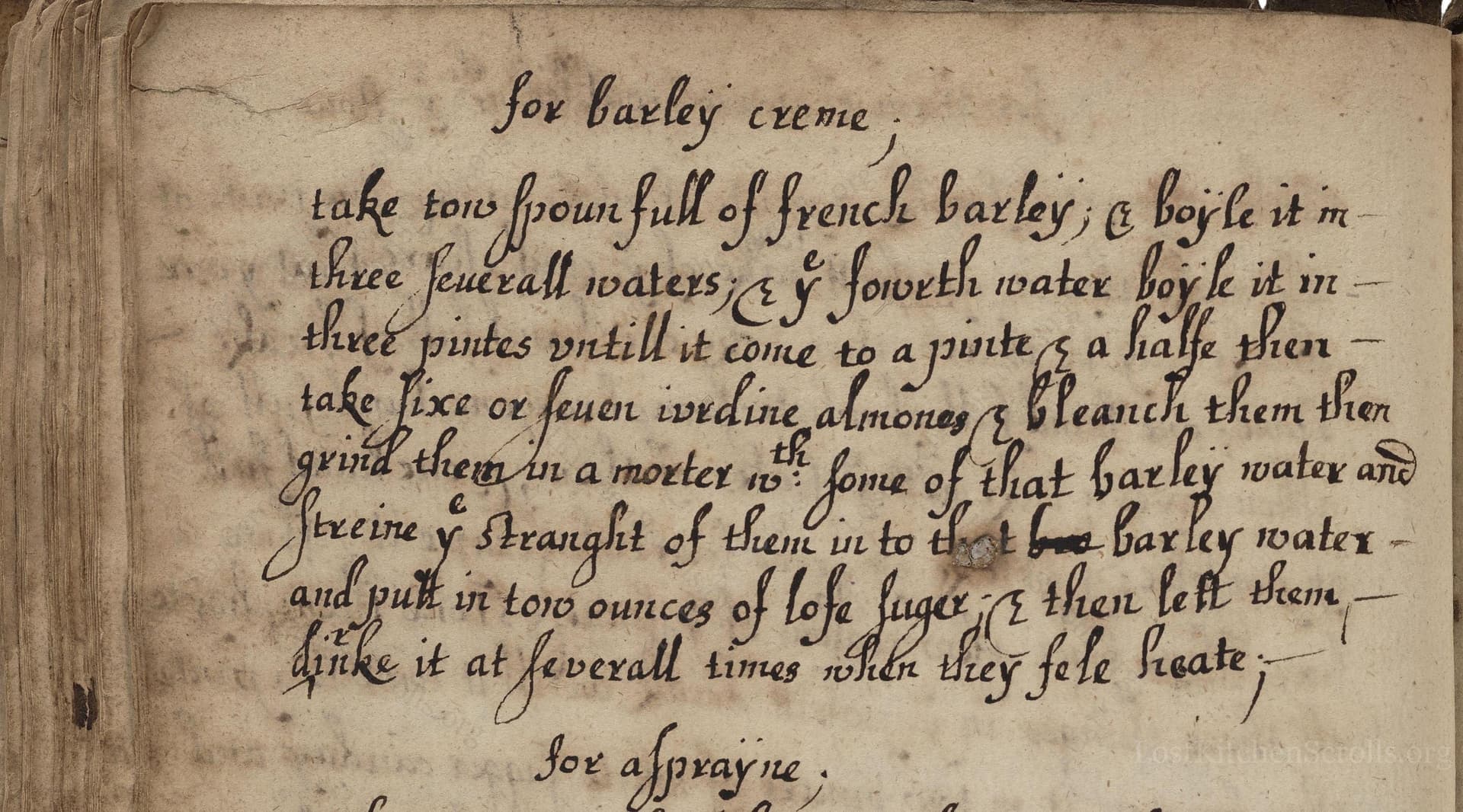For Barley Creme
From the treasured pages of Receipt book of Margaret Baker
Written by Margaret Baker

For Barley Creme
"take tow spounfull of french barley; & boyle it in three severall waters; & ye fowerth water boyle it in three pintes untill it come to a pinte & a halfe then take sixe or seven iordine almones, & bleanch them then grind them in a morter wth some of that barley water and streine ye draught of them in to that barley water and putt in tow ounces of lose suger, & then lett them drinke it at severall times when they fele heate;"
Note on the Original Text
The recipe’s spelling and syntax are typical of 17th-century English, with an abundance of non-standard spellings, variable use of semicolons, and minimal punctuation. Words like 'boyle' (boil), 'tow' (two), and 'spounfull' (spoonful) reflect phonetic spelling common for the time. Directions depend on assumed kitchen knowledge—exact boiling times are omitted, and measurements are either approximate or based on common domestic objects. Such instructions rely on the cook’s experience and judgment more than scientific precision.

Title
Receipt book of Margaret Baker (1675)
You can also click the book image above to peruse the original tome
Writer
Margaret Baker
Era
1675
Publisher
Unknown
Background
Step into the 17th-century kitchen with Margaret Baker, whose delectable recipes and culinary wisdom promise a feast of traditional flavors and genteel charms. A delightful collection for those who savor history as much as fine food.
Kindly made available by
Folger Shakespeare Library
This recipe hails from the manuscript of Margaret Baker, dated around 1675 in England, a period when households often turned to the kitchen for remedies as well as sustenance. Barley 'creme' or barley water, enriched with almonds, was used as a gentle, cooling drink to soothe fevers and bring comfort to those feeling overheated—likely both as nourishment and mild medicine. The addition of sugar and almonds reflects the 17th-century penchant for enriching otherwise plain remedies with more luxurious ingredients where possible.

Historically, this recipe would have been prepared using a sturdy cauldron or lidded pot over an open hearth or stove for boiling the barley. Almonds would be blanched by soaking in hot water, skins slipped away by hand. A mortar and pestle served to grind the almonds to a paste. Finally, a cloth or fine sieve would be employed to strain the almond and barley mixture, extracting the enriched liquid.
Prep Time
15 mins
Cook Time
1 hr
Servings
3
We've done our best to adapt this historical recipe for modern kitchens, but some details may still need refinement. We warmly welcome feedback from fellow cooks and culinary historians — your insights support the entire community!
Ingredients
- 0.7 oz (2 tablespoons) pearl barley
- 2 quarts water
- 6–7 whole blanched almonds (Jordan almonds), or standard blanched almonds as substitute
- 2 oz (1/4 cup) caster sugar
Instructions
- Begin by taking two tablespoons (about 0.7 oz) of pearl barley.
- Rinse and boil the barley in fresh water three times, discarding the water each time to remove excess starch and bitterness.
- For the fourth boil, add the rinsed barley to 2 quarts (about 1.8 quarts) of water and simmer, uncovered, until the liquid reduces by half to approximately 3 cups (25 fl oz).
- Meanwhile, take six or seven Jordan almonds (whole, blanched almonds) and remove their skins by soaking in hot water, then rubbing them free.
- Grind the blanched almonds with a little of the cooled barley water to form a smooth paste.
- Strain this mixture through a fine sieve or cheesecloth back into the barley water, extracting as much liquid as possible.
- Stir in approximately 2 ounces (1/4 cup) of caster sugar until dissolved.
- Allow the mixture to cool and serve chilled or at room temperature in small portions, particularly for soothing when experiencing heat or fever.
Estimated Calories
90 per serving
Cooking Estimates
Preparing the barley and almonds takes about 15 minutes. Simmering the barley water takes about 1 hour. This recipe makes about three small servings, each with around 90 calories. These numbers help you plan the cooking and know what to expect from each serving.
As noted above, we have made our best effort to translate and adapt this historical recipe for modern kitchens, taking into account ingredients nowadays, cooking techniques, measurements, and so on. However, historical recipes often contain assumptions that require interpretation.
We'd love for anyone to help improve these adaptations. Community contributions are highly welcome. If you have suggestions, corrections, or cooking tips based on your experience with this recipe, please share them below.
Join the Discussion
Rate This Recipe
Dietary Preference
Main Ingredients
Culinary Technique
Occasions

Den Bockfisch In Einer Fleisch Suppen Zu Kochen
This recipe hails from a German manuscript cookbook compiled in 1696, a time whe...

Die Grieß Nudlen Zumachen
This recipe comes from a rather mysterious manuscript cookbook, penned anonymous...

Ein Boudain
This recipe comes from an anonymous German-language manuscript cookbook from 169...

Ein Gesaltzen Citroni
This recipe, dating from 1696, comes from an extensive anonymous German cookbook...
Browse our complete collection of time-honored recipes



